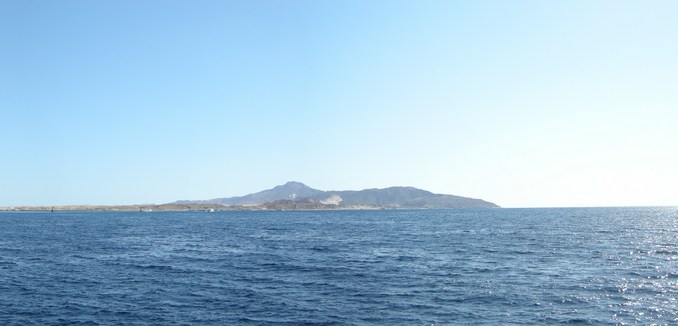The recent acceptance of Israel’s maritime rights by Saudi Arabia as part of a deal between the kingdom and Egypt, though far short of normalization, is still a “ray of light” that gives a boost to the nations opposing Iranian aggression in the Middle East, Eran Lerman and Joshua Teitelbaum wrote in an analysis for the Begin Sadat Center (BESA) on Sunday. Lerman is a former deputy national security advisor for the Israeli government and Teitelbaum is an expert on Saudi Arabia and pan-Arab politics.
The significance of last week’s announcement that Egypt would be transferring the islands of Tiran and Sanafir to Saudi Arabia comes from Riyadh’s acceptance of Israeli shipping rights through the Straits of Tiran, where the islands are located. In explaining the magnitude of this development, Lerman and Teitelbaum first shared some of the history behind islands.
Tiran and Sanafir were Saudi territory before 1949, when the kingdom ceded them to Egypt in “the context of the latter’s better ability to utilize them in the struggle with Israel.” In 1967 Egypt’s leader President Gamal Abdul Nasser violated “international norms” and closed the straits of Tiran to Israel, precipitating the Six-Day War. Although Israel captured the islands during the conflict, the 1979 Camp David Accords restored them to Egypt in exchange for Cairo’s guarantee of ensuring Israel the right of free passage through the straits. With the struggle against Israel now “irrelevant,” Lerman and Teitelbaum asserted that “it was thus more a matter of when rather than whether [the Saudis] will actually assert their claim.”
Egypt already notified Israel of its intent to transfer the islands last year and explained that Israel’s rights would be protected. The Saudis, according to Israeli Defense Minister Moshe Ya’alon, indirectly gave their assurances too.
Eran and Teitelbaum write that “the restoration of sovereignty serves to bolster the Saudi commitment to Egyptian stability.” They explain further, “With the need to confront Iran high above all other considerations in the Saudi and Egyptian national security playbook – and in Israel’s – any major step that helps bring together the “camp of stability” in the region under joint Egyptian-Saudi leadership will also serve Israel’s interests.”
Furthermore, despite Saudi protestations of no direct dealings with Israel, “the very fact that Saudi Arabia now undertakes to uphold in practice the obligations assumed by Egypt under the peace treaty means that Israel’s place in the region is no longer perceived by Arab leader Saudi Arabia as an anomaly to be corrected.” This reality, Lerman and Teitelbaum concluded, is “a welcome ray of light, demonstrating the benefits of cooperation and coordination in a region beset by so much violence.”
Simon Henderson, director of the Gulf and Energy Policy Program at The Washington Institute for Near East Policy, made similar observations last week:
While this seems to confirm the good working relationship between Israel and Egypt, which these days includes close cooperation on counterterrorism and natural gas development, it could also reflect a growing maturity in tentative Saudi links with Jerusalem. Officially, Riyadh still opposes formal relations with Israel, but both countries obviously share similar views on key issues such as the threat posed by Iran. The latest development in the Straits of Tiran suggests that their agenda of common interests is broadening.
Last week, Ya’alon said, “We reached an agreement between the four parties – the Saudis, the Egyptians, Israel and the United States – to transfer the responsibility for the islands, on condition that the Saudis fill in the Egyptians’ shoes in the military appendix of the [1979 Israel-Egypt] peace agreement.” Only Egyptian civilian police and United Nations forces will be allowed to be stationed on the island.
The actual transfer of the islands requires ratification by Egypt’s parliament and will only take place 65 years later, according to Egyptian media.
[Photo: Matt Kieffer / Flickr ]




